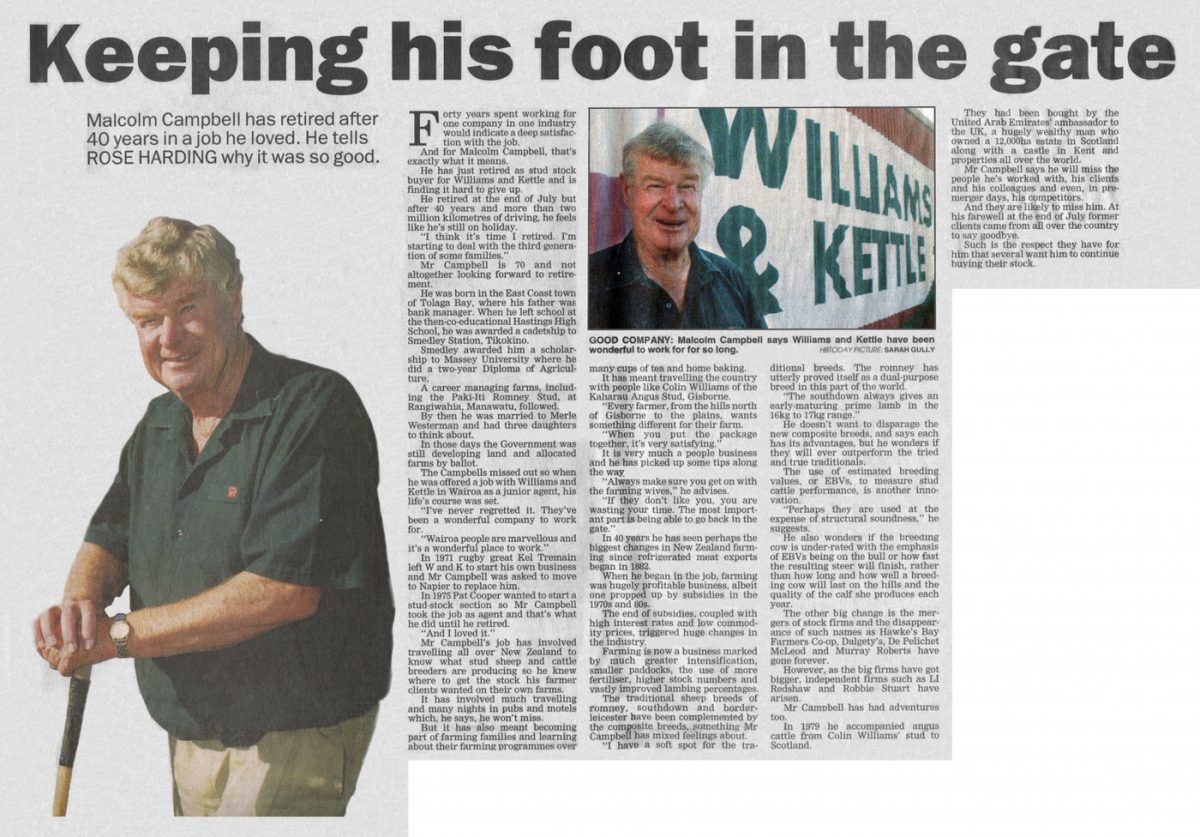Keeping his foot in the gate
Malcolm Campbell has retired after 40 years in a job he loved. He tells ROSE HARDING why it was so good.
Forty years spent working for one company in one industry would indicate a deep satisfaction with the job.
And for Malcolm Campbell, that’s exactly what it means.
He has just retired as stud stock buyer for Williams and Kettle and is finding it hard to give up.
He retired at the end of July but after 40 years and more than two million kilometres of driving, he feels like he’s still on holiday.
“I think it’s time I retired. I’m starting to deal with the third generation of some families.”
Mr Campbell is 70 and not altogether looking forward to retirement.
He was born in the East Coast town of Tolaga Bay, where his father was bank manager. When he left school at the then-co-educational Hastings High School, he was awarded a cadetship to Smedley Station, Tikokino.
Smedley awarded him a scholarship to Massey University where he did a two-year Diploma of Agriculture.
A career managing farms, including the Paki-Iti Romney Stud, at Rangiwahia, Manawatu, followed.
By then he was married to Merle Westerman and had three daughters to think about.
In those days the Government was still developing land and allocated farms by ballot.
The Campbells missed out so when he was offered a job with Williams and Kettle in Wairoa as a junior agent, his life’s course was set.
“I’ve never regretted it. They’ve been a wonderful company to work for.
“Wairoa people are marvellous and it’s a wonderful place to work.”
In 1971 rugby great Kel Tremain left W and K to start his own business and Mr Campbell was asked to move to Napier to replace him.
In 1975 Pat Cooper wanted to start a stud-stock section so Mr Campbell took the job as agent and that’s what he did until he retired.
“And I loved it.”
Mr Campbell’s job has involved travelling all over New Zealand to know what stud sheep and cattle breeders are producing so he knew where to get the stock his farmer clients wanted on their own farms.
It has involved much travelling and many nights in pubs and motels which, he says, he won’t miss.
But it has also meant becoming part of farming families and learning about their farming programmes over many cups of tea and home baking.
It has meant travelling the country with people like Colin Williams of the Kaharau Angus Stud, Gisborne.
“Every farmer, from the hills north of Gisborne to the plains, wants something different for their farm.
“When you put the package together, it’s very satisfying.”’
It is very much a people business and he has picked up some tips along the way.
“Always make sure you get on with the farming wives,” he advises.
“If they don’t like you, you are wasting your time. The most important part is being able to go back in the gate.”
In 40 years he has seen perhaps the biggest changes in New Zealand farming since refrigerated meat exports began in 1882.
When he began in the job, farming was hugely profitable business, albeit one propped up by subsidies in the 1970s and 80s.
The end of subsidies, coupled with high interest rates and low commodity prices, triggered huge changes in the industry.
Farming is now a business marked by much greater intensification, smaller paddocks, the use of more fertiliser, higher stock numbers and vastly improved lambing percentages.
The traditional sheep breeds of romney, southdown and border-leicester have been complemented by the composite breeds, something Mr Campbell has mixed feelings about.
“I have a soft spot for the traditional breeds. The romney has utterly proved itself as a dual-purpose breed in this part of the world.
“The southdown always gives an early-maturing prime lamb in the 16kg to 17kg range.”
He doesn’t want to disparage the new composite breeds, and says each has its advantages, but he wonders if they will ever outperform the tried and true traditionals.
The use of estimated breeding values, or EBVs, to measure stud cattle performance, is another innovation.
“Perhaps they are used at the expense of structural soundness,” he suggests.
He also wonders if the breeding cow is under-rated with the emphasis of EBVs being on the bull or how fast the resulting steer will finish, rather than how long and how well a breeding cow will last on the hills and the quality of the calf she produces each year.
The other big change is the mergers of stock firms and the disappearance of such names as Hawke’s Bay Farmers Co-op, Dalgety’s, De Pelichet McLeod and Murray Roberts have gone forever.
However, as the big firms have got bigger, independent firms such as LI Redshaw and Robbie Stuart have arisen.
Mr Campbell has had adventures too.
In 1979 he accompanied angus cattle from Colin Williams’ stud to Scotland.
They had been bought by the United Arab Emirates’ ambassador to the UK, a hugely, wealthy man who owned a 12,000ha estate in Scotland along with a castle in Kent and properties all over the world.
Mr Campbell says he will miss the people he’s worked with, his clients and his colleagues and even, in pre-merger days, his competitors.
And they are likely to miss him. At his farewell at the end of July former clients came from all over the country to say goodbye.
Such is the respect they have for him that several want him to continue buying their stock.
Photo caption – GOOD COMPANY: Malcolm Campbell says William and Kettle have been wonderful to work for for so long.
HBTODAY/PICTURES: SARAH GULLY












Do you know something about this record?
Please note we cannot verify the accuracy of any information posted by the community.